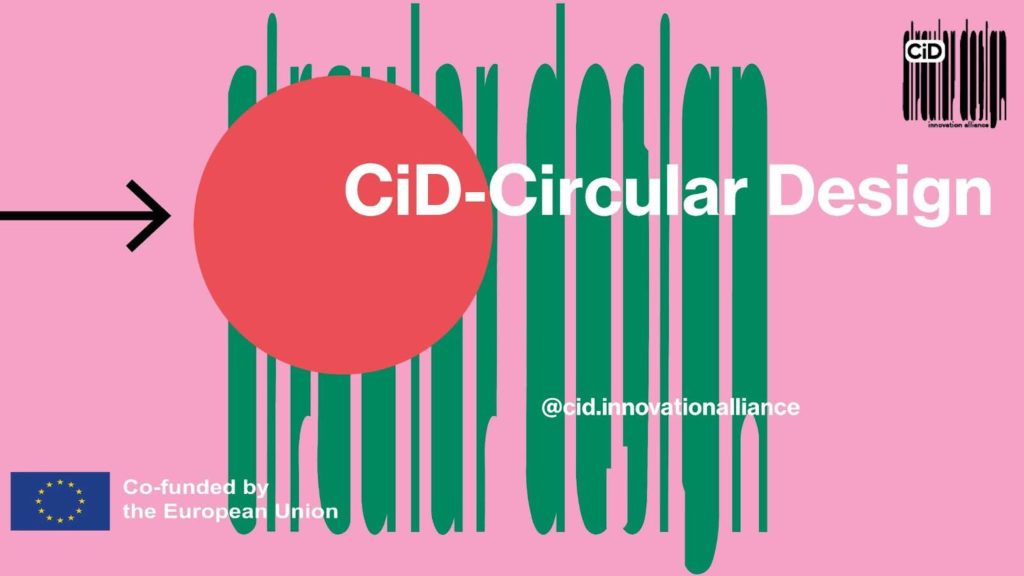| EU Project | Circular design for bio-based innovation towards climate-neutral cities (2023-2026) |
| Description | CiD focuses on Bio-based Innovation for the built environment by using bio-materials from other sectors, creating regional circular systems in renewable materials, and installing buildings as bio-machines. |
| EU Call | ERASMUS+ Alliances for Education and Enterprises |
| Total Funding | 1 499 520.00 € |
| IAAC Department | Advanced Architecture Group |
| AAG Team | Chiara Farinea, Fiona Demeur, Areti Markopoulou |
| IAAC Students | MAA01 Students |
| Partners | Leibniz University Hannover (DE) University of Genoa (IT) ARCHES (IT) ERSILIA Foundation (ES) Architekturos Fondas (LT) ACE (BE) ALDA (IT) TEI Inkubaator Tallinn (EE Materiom (UK) CNR (IT) Ellen MacArthur Foundation (UK) |
| Website | https://www.cid-innovationalliance.eu |

CiD focuses on Bio-based Innovation for the built environment by using bio-materials from other sectors, creating regional circular systems in renewable materials, and installing buildings as bio-machines. Green, digital, resilience and entrepreneurial skills in Circular Design are developed through an Innovation Ecosystem that brings together relevant actors from HEIs and VET with the broader socio-economic environment (RTO, municipalities, civil society and businesses). The Alliance develops innovation in Circular Design education by fostering entrepreneurship in academia, with an accelerator and continuing education programmes to upskill in emerging labour market profiles and enabling the creation of green start-ups.
The built environment is in the focus of global efforts to limit and deal with climate change. Nearly 40% of CO2 emissions worldwide come from the construction, use, and demolition of buildings (UN 2020), even more are linked to mobility and everyday tools for an increasing urban population. Of the total waste generated in Europe, 36% come from building construction and demolition (Eurostat 2020), a triple challenge for the aim of carbon neutrality: the wasted energy consumed for production and then for demolition, the use of finite and carbon-based resources, and the energy wasted in transport. Not at least, market volatility, raising prices, and cuts of supply and production lines urge us to rationalise and reinvent how we shape and transform the built environment. To reach the resilience of communities we need to address not only efficiency in energy and resources (IRP 2020) but overall production and transformation processes of buildings and cities.
In this framework, Design is at the forefront to achieve climate-neutral cities in Europe, a green transition and ecological resilience—as living places and as main stages for societal change—is on the agenda. Circular economy offers pathways to innovate creative design sectors that are active in this transition and are crucial for the cultural change and social inclusion needed. In a multidisciplinary approach the Innovation Alliance Circular Design (CiD) addresses the gap in skills and knowledge, in the sectors of architecture, urban design, product/service design, offering a radically new model on how to link design to circularity and urban transformation. It contributes to the New European Bauhaus’ aim for merging creativity, arts, and technology for the Green Deal.
ALLIANCE OVERVIEW – EDUCATION AND TRAINING REPRESENTATION
The Innovation Alliance CiD brings together on a unique platform HEIs, VETs, RTOs, companies, sector and civil society organisations, incubators and investors in order to create an Innovation Ecosystem for the co-creation of knowledge and to accelerate the transfer of research and innovation to education. CID foresees a clear transnational approach with 11 partners from 8 countries across Europe. Important and innovative education and training providers:
– Leibniz University Hannover (LUH) with its Institute of Urban Design and Planning,
– Institute of Advanced Architecture of Catalonia (IAAC) with its Advanced Architecture group,
– University of Genova (UNIGE) with its Product and Service Design group,
– and ARCES as an experienced vocational training provider in the ASSOFOR network of VET centres.
Among others different entrepreneurial partners active in the labour market and experts in green skills directly are involved in the project and useful in establishing observatories for innovation ecosystems:
– ACE Architects’ Council of Europe representing the interests of European architects SME and supporter for accreditation and qualification,
– Materiom as unique platform for SME using bio-materials in design,
– Architekturos Fondas Vilnius/Lithuania active in the building culture and partner of the Future Architecture network co-funded by Creative Europe.
– Business Inkubaator in Tallinn (TEI), a successful centre for business development of SME in CCI.
Four further partners complement with specific expertise:
– ALDA Europe as a NGO of +500 municipalities and civil society organisations active for sustainability,
– ERSILIA as consultancy and evaluation expert partner,
– Department of Biology of the Consiglio Nazionale delle Ricerche (CNR) as first level RTO.
– Ellen MacArthur Foundation, recognised worldwide for leading the transition to a circular economy.
This project has received funding from the European Union’s Erasmus+ programme under grant agreement No.101111686.

